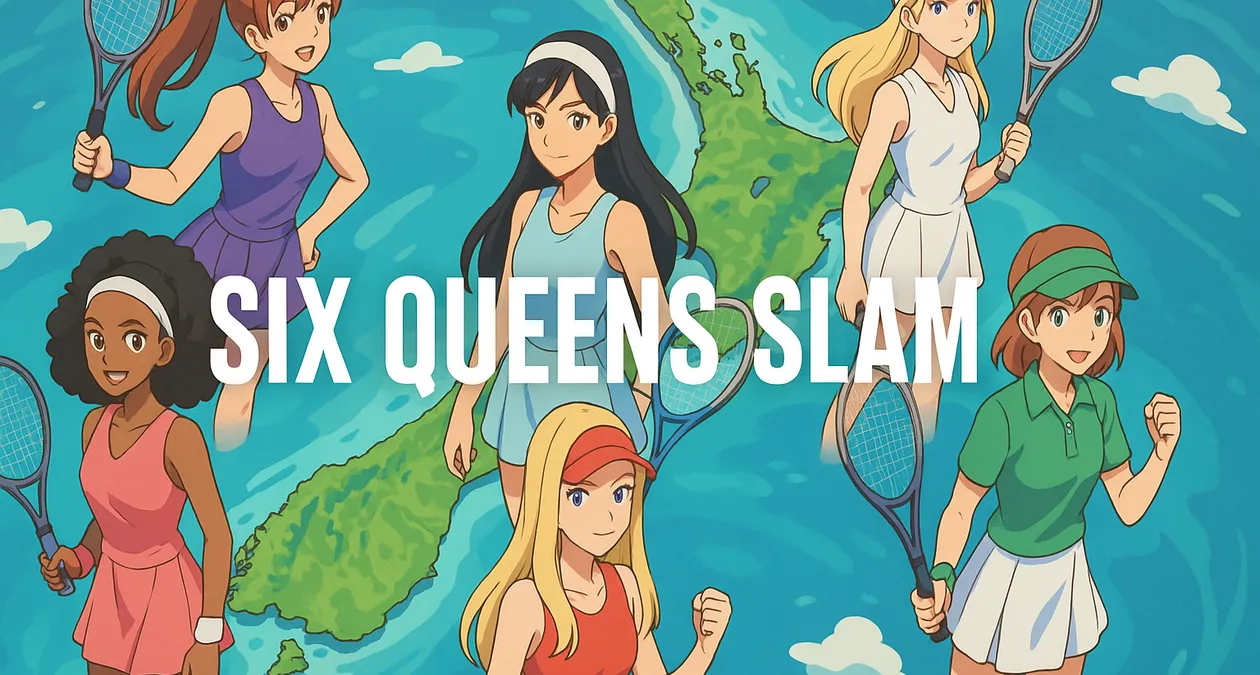While the men’s Six Kings Slam dazzles under the floodlights of Riyadh — a spectacle built on oil wealth and luxury — women’s tennis deserves something more meaningful. Something cleaner. Fairer. Groundbreaking.
Enter the idea of the Six Queens Slam — a visionary counterpoint hosted in New Zealand, the first nation to grant women the right to vote. A tournament that would not just entertain, but stand for something.
A Counterweight to the Oil Arena
The Six Kings Slam in Saudi Arabia is designed for excess: gold-plated courts, private jets, and streaming deals wrapped in spectacle. Yet it leaves a vacuum — a moral and symbolic gap in the sport’s global narrative.
The Six Queens Slam could fill it.
By hosting it in Aotearoa New Zealand, tennis would draw a deliberate contrast: away from petro-dollars, toward progress, sustainability, and equality.
Here, the story would not be about who spends most — but about who inspires most.
“If Riyadh built a monument to wealth,” one imagined organizer says, “then New Zealand (or Australia) can build a monument to what women’s sport stands for: courage, equality, and conscience.”
Why New Zealand Is the Best Choice
No country fits this vision better.
In 1893, New Zealand became the first democracy to give women the right to vote, lighting a spark that spread across the world. Its values — fairness, environmental care, and social inclusion — mirror the very ideals modern sport should embrace.
Staging the Six Queens Slam there would be poetic justice: women rewriting tennis history on the same soil where women first rewrote democracy.
Even Australia could host it, perhaps during the Chinese Swing — they were pioneers too.
The Six Queens Who Would Lead It
The proposed lineup would gather six trailblazers, not just athletes:
- Iga Swiatek – Methodical, principled, outspoken on equality.
- Aryna Sabalenka – Fierce, emotional, unfiltered — tennis in raw form.
- Coco Gauff – The conscience of a generation, using her voice as much as her forehand.
- Elena Rybakina or Daria Kasatkina – Quiet strength, the modern face of calm conviction.
- Ons Jabeur – Bridging cultures, bringing joy to a divided world.
- Naomi Osaka – A returning icon who embodies authenticity and activism.
Six women, six continents, one message: tennis can lead with values, not vanity.
Format and Feel
The Six Queens Slam wouldn’t mimic the testosterone of Riyadh’s gladiatorial showdowns.
Instead, it would blend competition and conscience — high-energy matches in eco-powered arenas, with carbon-neutral logistics, equal pay, and player-led social initiatives attached to every ticket sold.
Matches would follow a fast, story-driven format — short sets, dramatic tiebreaks, behind-the-scenes storytelling on Netflix, and real conversations about what change in sport can look like.
A Cultural Turning Point
The world doesn’t need a mirror image of the Six Kings Slam.
It needs an answer.
New Zealand offers the setting for that answer: a country defined by equality, free from the shadows of sportswashing, where women could headline not as guests of power, but as architects of it.
The Six Queens Slam would be the first global sporting event built on principle, not profit — a redefinition of what elite competition can represent in the 21st century.
Final Word
If the men have their oil empire, let the women build their moral legacy.
Let the floodlights burn on renewable energy, let the applause echo from the nation that first believed in equality, let the stands be filled with grassroots tennis fans, and let the Six Queens Slam rise not from opulence, but from conviction.
Because sometimes, sport’s greatest revolution isn’t about power — it’s about values.
Note: This article does not contain any other related articles you might like.
It’s a dream.
